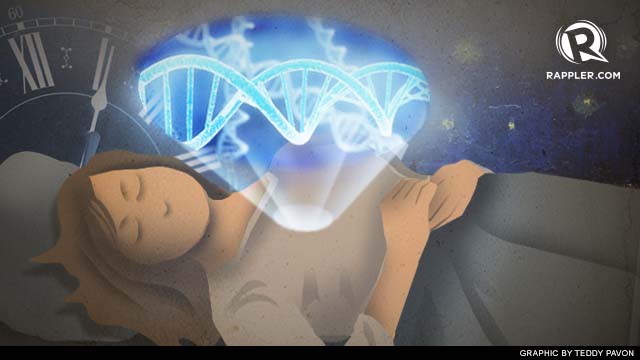SUMMARY
This is AI generated summarization, which may have errors. For context, always refer to the full article.
 If you, as Robert Frost insisted, have “promises to keep and miles to go before you sleep,” chances are you may soon (if you don’t yet) suffer diseases because you messed with your genes that do their “best” work when you get enough sleep.
If you, as Robert Frost insisted, have “promises to keep and miles to go before you sleep,” chances are you may soon (if you don’t yet) suffer diseases because you messed with your genes that do their “best” work when you get enough sleep.
How many hours is enough? Scientists from the Health and Medical Sciences of the University of Surrey in the UK think it should be about 8 hours. Their study was published February 2013 in the Proceedings of the National Academy of the United States.
Many previous studies have focused on the effect of sleep (lack and too much of it) on diseases and the ability to concentrate. Indeed, mere observation of our habitually sleep-deprived family and friends reveal to us that lack of or too much sleep does play a role in our physical and mental health.
But how does it happen? The scientists who did the abovementioned research wanted to see deep so they checked at the most basic level: how sleep affects our genes.
Our DNA carries the instructions as to how our organs will assemble themselves, how they will function, and as a whole, how our bodies will operate. The scientists zeroed in on a group of molecules called RNA that carries out the instructions embedded in our DNA. RNA are molecules that are like the members of various guilds. A theater guild, a dance guild, or a sculpture guild would have their set of members just like each of our organs would have their own set of RNA called transcriptome.

Sleep has been known to affect for instance, the liver transcriptome, but it is very difficult to check it multiple times. This time, however, the scientists focused on the blood transcriptome which is easy to check in humans, and could be done multiple times unlike organs like the liver.
They had 26 participants who got no more than 5.7 hours of sleep a night for a week while the control group got 8.5 hours of sleep per night for a week. It turns out that if we humans were deprived of sleep even for just a week, we affect 711 out of our 25,000 genes.
Genes affected deal with the balance we achieve when we are asleep, the processing of the energy we need that requires oxygen, including the wastes produced in the process which could cause damage to our cells overtime. But what interests us now is that a good number of those genes have to do with our internal clocks called the “circadian rhythm.”
Defense system
Our circadian rhythm signals, among others, certain chemicals or hormones to be produced and do their thing in our bodies so we could function properly. And if you still think those are way too technical for you to care, try this: At the level that we can feel and eloquently trouble our doctors with, too little sleep affects your immune system’s response to threats to your health.
In other words, not getting a timely and sufficient sleep compromises your own defense system which is what you rely on every day to keep you from falling apart.
The scientists say that having seen what insufficient sleep does to your blood is a good window to what happens to your other organs under sleep deprivation. This is because many of the members of the blood “guild” are shared with 9 other tissues including the brain, heart, kidney, prostate, and lungs. So there is a really good chance that you mess up the blood, and you mess up so much more.
So instead of Frost, we might just want to go with Shakespeare’s advice, as he wrote in Macbeth, to get more than just some sleep because it is “Sweet sleep that knits up the ravelled sleave of care; the death of each day’s life, sore labor’s bath…”
Would Shakespeare have written that differently if he had imagined a future when everyone is assumed to be awake all the time to write and read email, text messages and posts? Our cultural clocks may have drastically changed, but it would seem that our inner schedules do not readily agree so we pay the price of being awake longer than we should be. – Rappler.com
Maria Isabel Garcia is a science writer. She has written two books, “Science Solitaire” and “Twenty One Grams of Spirit and Seven Ounces of Desire.” Her column appears every Friday and you can reach her at sciencesolitaire@gmail.com.
Add a comment
How does this make you feel?
There are no comments yet. Add your comment to start the conversation.